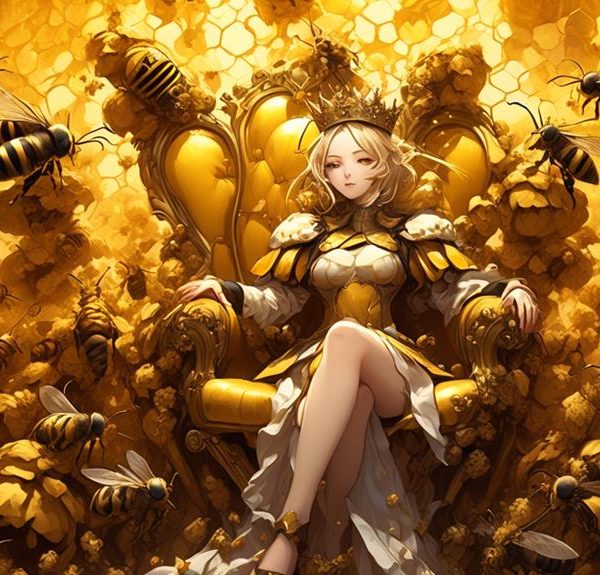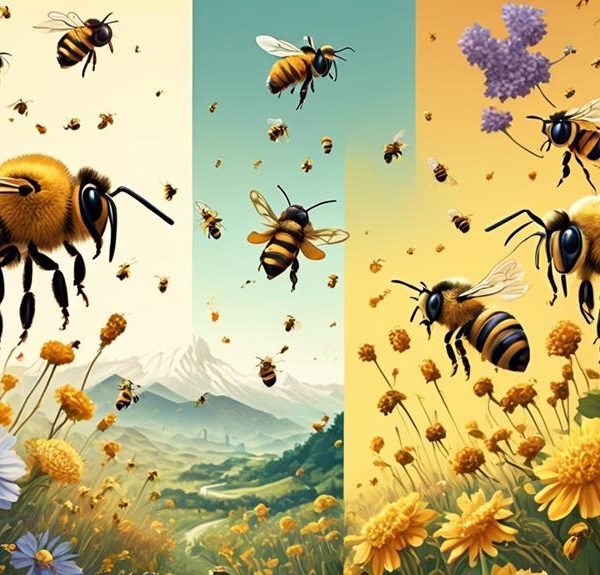Find out if your blood type influences bee attraction in this intriguing exploration into the mysterious world of bees.
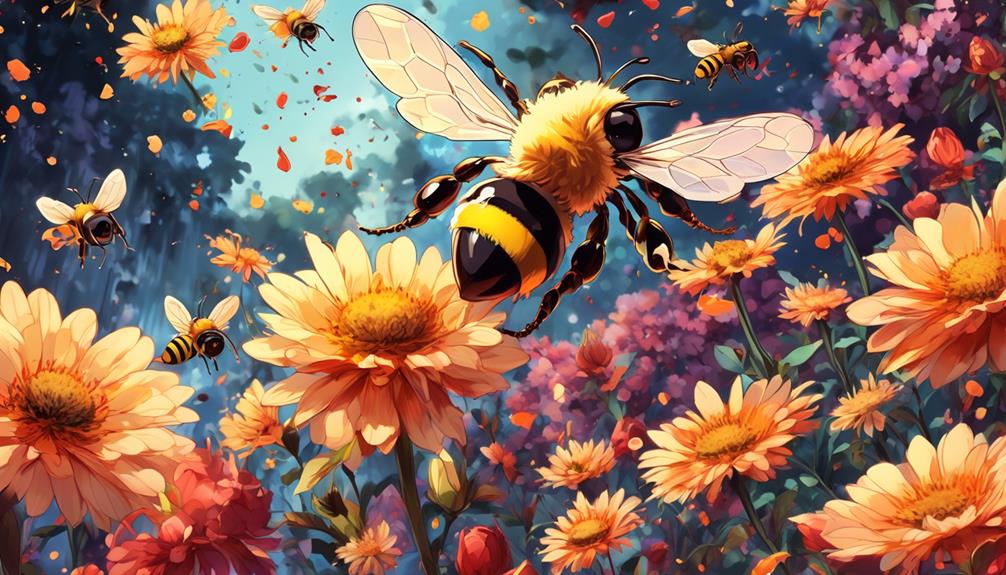
What Blood Type Do Bees Like?
Ever wake up and think, 'I wonder what blood type bees prefer?' Probably not, but it's an interesting question nonetheless.
Now, you might be scratching your head, wondering if bees, those tiny buzzing insects notorious for their painful stings, really care about the type of human blood they encounter. Well, it's a curious concept, considering they don't suck blood like mosquitoes.
But what if there's more to their attraction than meets the eye? Stick around, because this might just give you a whole new insight into the world of bees.
Key Takeaways
- Bees are primarily attracted to colors and scents, not blood types.
- Bee stings are a defense mechanism, not an act of attraction.
- Bees cannot differentiate between human blood types.
- Understanding these facts can help alleviate unnecessary fear of bees.
Understanding Bee Attraction Factors
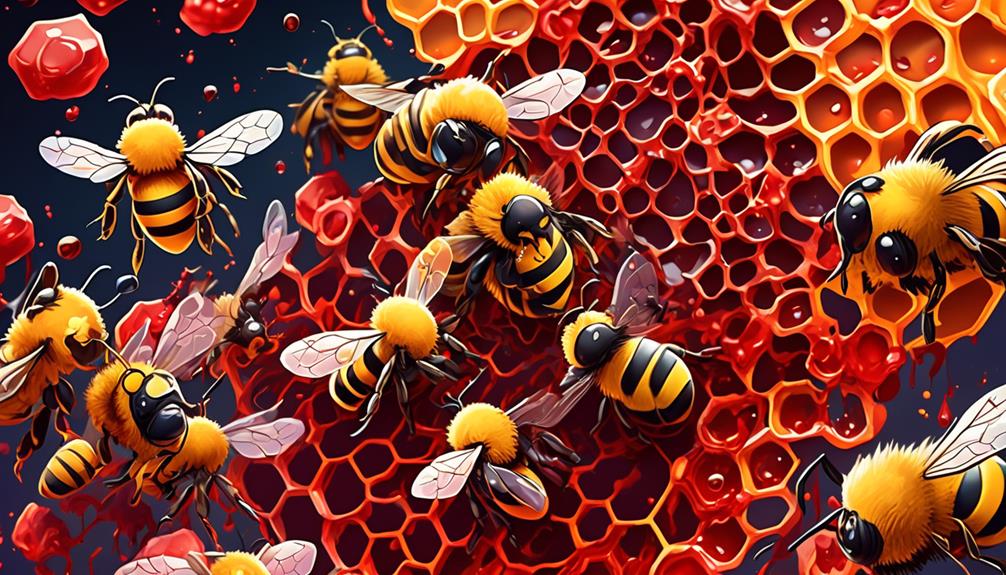
To get a grasp on why bees might prefer certain blood types, it's crucial to dive into the factors that influence their attraction towards humans.
Primarily, you should understand that bees are driven by their need for survival, which primarily involves the search for nectar. This quest, in turn, is influenced by their visual and olfactory senses.
Bees are attracted to colors, particularly those on the blue and purple spectrum. They also have a keen sense of smell, which they use to locate nectar-rich flowers. When you're outdoors, your natural body odor, coupled with any floral-scented products you might be using, could make you a target.
Now, it's tempting to link this to blood type, but the connection isn't straightforward. Bees don't have a mechanism to identify human blood types. Rather, it's the secondary characteristics often associated with different blood types that may influence a bee's attraction.
For instance, people with Type O blood are known to release more body heat, which could potentially attract bees. Therefore, it's not the blood type per se, but the associated traits, that may make you more alluring to bees.
The Science Behind Bee Stings
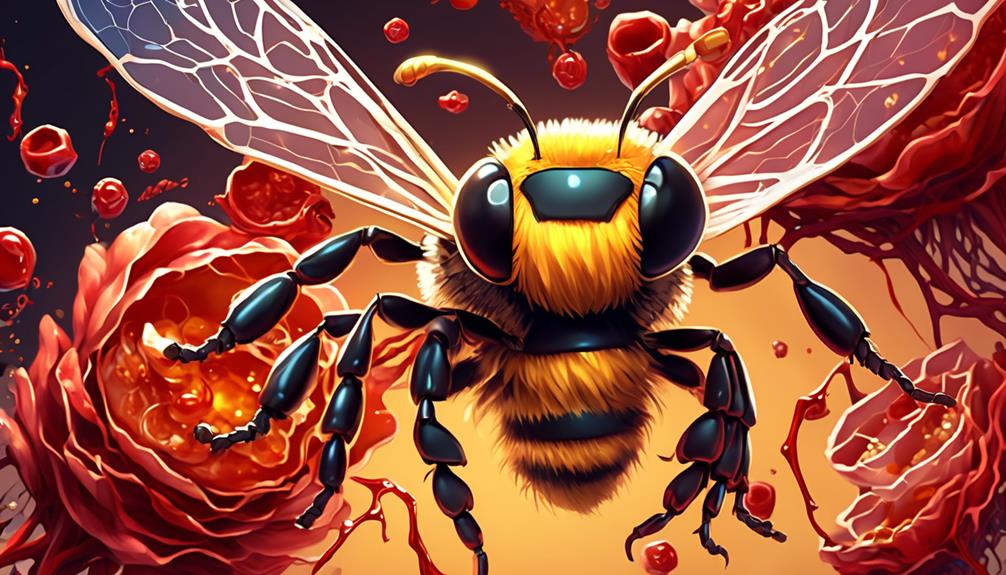
Often, you might wonder why bees sting, a question that can be answered by delving into the intricate science behind this defensive mechanism. You see, bees don't sting out of malice, but out of self-defense or to protect their hive.
When a bee stings, it's not a simple prick. The bee's stinger is barbed, and this design isn't accidental. It's meant to lodge into an attacker's skin, ensuring the delivery of a venom known as apitoxin. This venom doesn't just cause pain; it signals other bees to the threat, escalating the defensive response.
Interestingly, not all bees can sting. In a typical hive, the worker bees, who are all females, are the defenders and possess this stinging ability. The drone bees, males, lack stingers entirely. The queen bee can sting, but she usually reserves this for rival queens.
Therefore, understanding the science behind bee stings helps you appreciate the complexities of their world. It's not about the blood type they're attracted to, but more about their survival instincts. Bees aren't just pain-inflicting insects; they're fascinating creatures exhibiting remarkable defensive strategies.
Blood Type: Does It Matter?
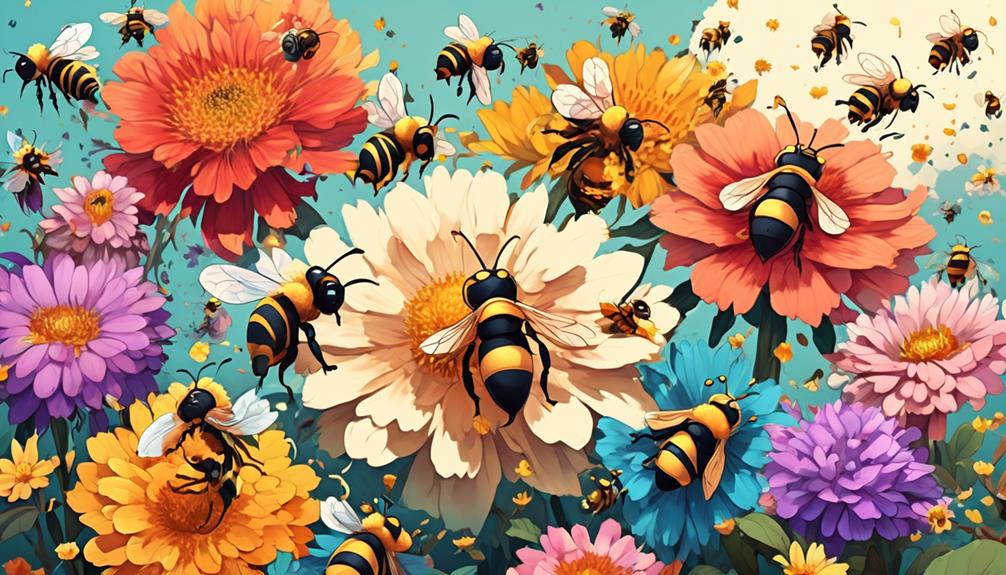
Despite popular myths, there's no scientific evidence to suggest that bees are attracted to specific human blood types. You might've heard anecdotes about people with certain blood types being stung more often, but it's important to understand that these stories aren't backed by empirical data.
Bees are primarily attracted by colors and scents, not blood. They can't smell your blood type or see it. What they're interested in are flowers, which provide them with the nectar and pollen they need to survive. Your blood type has no bearing on a bee's decision to sting you.
Furthermore, a bee sting is usually a defense mechanism, not an act of attraction. If a bee feels threatened, it'll sting, regardless of your blood type. Therefore, it's your actions, not your blood type, that can increase or decrease your chances of being stung.
Common Myths About Bees and Blood
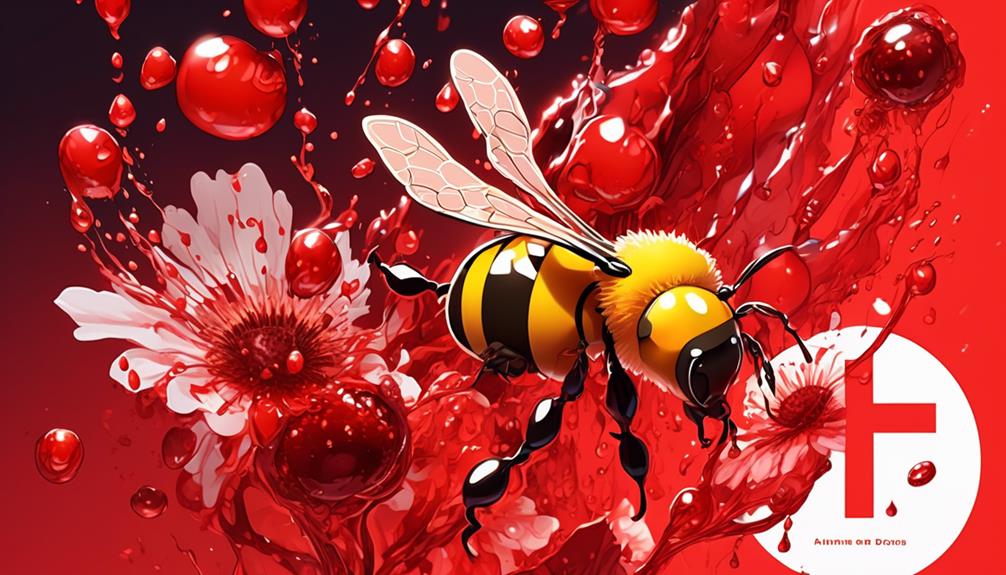
Shifting our focus, let's unpack some of the prevalent myths surrounding bees and human blood, which have caused unnecessary panic and misinformation. You've probably heard tales about bees being attracted to certain blood types, or even the absurd notion that bees can smell blood. These misconceptions are not only wide off the mark but also foster an undue fear of these vital pollinators.
To clarify, here's a quick table dispelling these myths:
Myth | Fact | Explanation |
|---|---|---|
Bees are attracted to certain blood types | False | Bees lack the ability to differentiate between blood types. |
Bees can smell human blood | False | Bees are attracted to floral scents, not blood. |
A bee sting can cause blood poisoning | Rarely True | Only if the bee is carrying harmful bacteria, which is highly unlikely. |
Contrary to these myths, bees are actually attracted to sweet things like nectar and certain perfumes. They're not out to get your blood. Understanding these facts can help alleviate unnecessary fear and foster a more harmonious coexistence between humans and bees. Let's continue to debunk these misconceptions to protect our vital pollinators.
Research Insights on Bees' Preferences
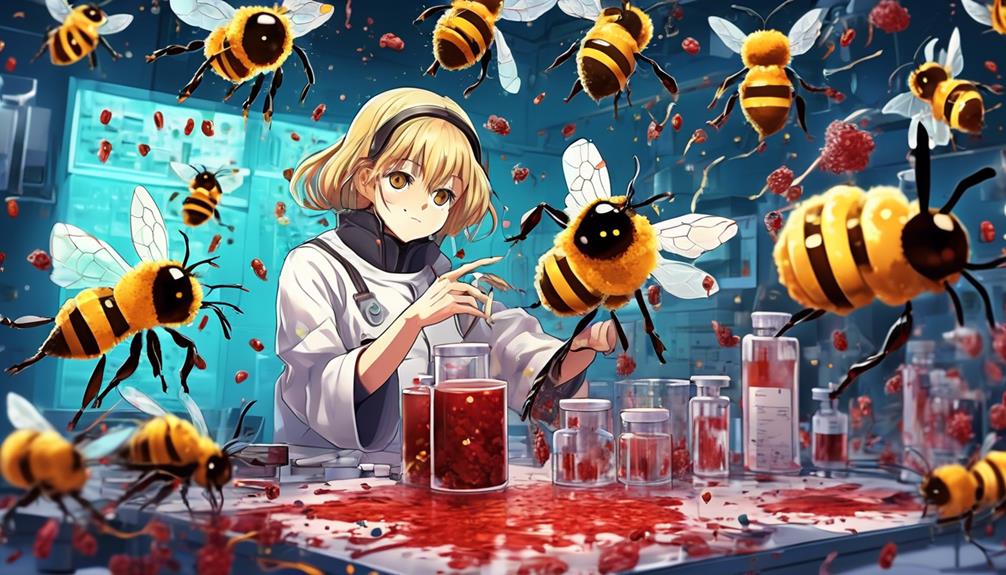
Surprisingly, research has consistently shown that bees aren't indiscriminate in their preferences, but rather display strong inclinations toward certain floral scents and colors. You'd be fascinated to learn that bees are particularly drawn to flowers with blue and violet hues. They perceive these colors more vividly because of their unique photoreceptor sensitivity range.
Scientists have also discovered that bees have a remarkable preference for floral scents rich in certain volatile organic compounds, such as linalool and geraniol. These compounds are typically present in flowers that produce nectar, which bees rely on for food. Essentially, these scents serve as an aromatic billboard, signaling the presence of a possible food source.
Furthermore, bees' preferences aren't constant but change with their age and role within the hive. For instance, older worker bees are more attracted to the scent of flowers than their younger counterparts.
Practical Tips to Avoid Bee Stings
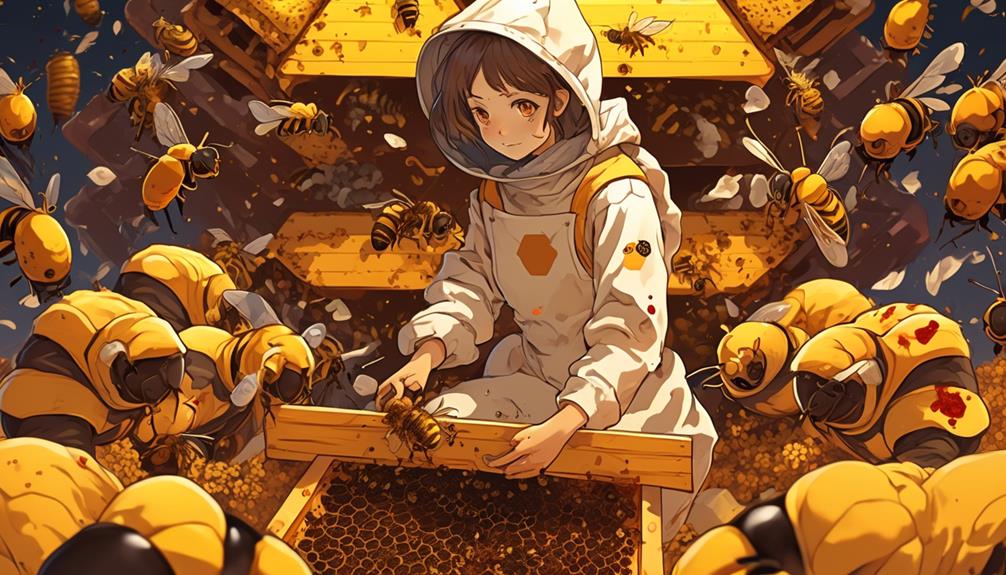
Understanding these preferences of bees for certain colors and scents can help you reduce your chances of getting stung; let's explore some practical strategies for avoiding bee stings.
First, avoid wearing bright colors or floral prints, which can attract bees. Opt for light, solid colors instead.
Secondly, watch your scent. Strong perfumes, colognes, or lotions can mimic the smell of flowers, drawing bees towards you. If you're planning to be in an area with a high bee population, try to use unscented products.
Another practical tip involves mindful eating. Bees are attracted to sweet foods and drinks, so try to consume these indoors or under a cover when outdoors. Also, keep your trash bins sealed. Decomposing food emits strong odors that might attract bees.
Additionally, if a bee comes near you, resist the urge to swat it away. Rapid movements can provoke a defensive sting. Instead, stay calm and move away slowly.
Lastly, be careful around flowering plants, water sources, and bee hives. These are places where bees are likely to congregate.
Through careful color and scent choices, mindful eating, slow movements, and awareness of bee hotspots, you can significantly reduce your risk of being stung.
Frequently Asked Questions
What Is the Average Lifespan of a Bee?
You're curious about a bee's average lifespan. It's not a one-size-fits-all answer.
Worker bees typically live 5-6 weeks in summer, while drones live around 8 weeks. Remarkably, queen bees can live up to 5 years.
These lifespans fluctuate based on factors like species, environment, and role within the hive. So, while we can't pinpoint an exact number, we've got a good range to work with.
Fascinating, isn't it?
How Many Different Types of Bees Are There?
Scientifically speaking, there's no such thing as bees liking a particular blood type because they don't feed on blood.
Now, in regards to your question, there's quite a diverse world of bees. You'd be amazed to know that there are about 20,000 different species of bees worldwide. They vary greatly in size, habitat, and behavior. This diversity demonstrates the adaptability of bees in response to different environments.
What Are the Nutritional Requirements of a Bee?
Bees don't care about blood types because they're not vampires! They need pollen and nectar from flowers.
Pollen provides them with proteins, fats, and minerals. Nectar gives them energy through sugars. Some bees also collect water to regulate hive temperature and to dilute honey for larvae.
How Does Climate Change Affect Bee Populations?
Climate change directly impacts bee populations. As you may know, bees are sensitive to temperature changes. Warmer temperatures can disrupt their hibernation cycles and cause early emergence, before plants have bloomed. This lack of food can lead to colony collapse.
Additionally, changes in precipitation can alter the availability of flowers, affecting bees' food supply. So, it's clear: climate change poses a significant threat to these vital pollinators.
How Can Someone Start Beekeeping as a Hobby or Business?
To start beekeeping, you'll first need to research and understand the biology of bees.
Then, you'll need to acquire the essential equipment: a hive, protective gear, and a bee colony.
It's also important to get training through a local beekeeping class, online tutorials, or books.
You should check your local regulations regarding beekeeping.
Conclusion
In conclusion, your blood type doesn't influence bee attraction. Bees are enticed by flowers' scent, not human blood. The notion that bees prefer certain blood types is a myth, unsupported by scientific evidence.
To avoid bee stings, there are several precautions you can take. First, it's important to stay clear of their hives, as this is their territory and they may become defensive if they feel threatened. Additionally, it can be helpful to avoid wearing bright colors and floral perfumes, as these may attract bees. Lastly, keeping your food covered can help prevent bees from being attracted to it.
It's important to remember that bees are essential pollinators and play a crucial role in our ecosystem. Therefore, it's important to respect their space while enjoying the outdoors. By taking these precautions, you can minimize the chances of getting stung by a bee while still appreciating their important role in nature.

